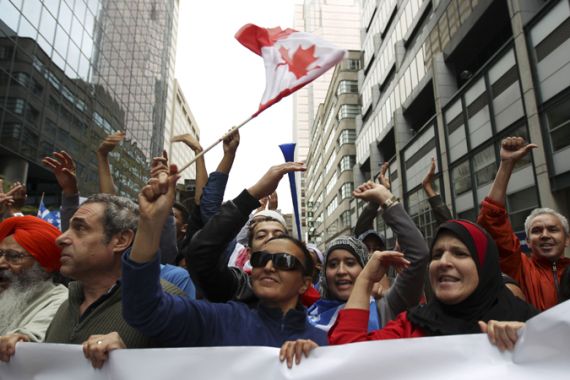Quebec party wants ban on religious symbols
Parti Quebecois wants legislation to keep religion and religious clothing, such as turbans and scarves, out of workplace

A separatist party in Quebec has proposed a law that would ban public employees from wearing religious symbols in the workplace.
The Parti Quebecois introduced its Charter of Values in the province’s legislature. The law would require government employees to take off their headscarves, yarmulkes, turbans and larger-than-average crucifixes.
The prohibitions would apply to civil servants, teachers, police, firefighters, doctors, nurses and public day care employees.
It would also prohibit citizens from covering their faces while receiving public services, such as applying for driver’s licences, for the purpose of identification.
The opposition Liberals oppose the plan, except for the provision banning people from covering their faces while getting state services.
The Parti Quebecois does not have a majority in the provincial legislature, and the law is unlikely to pass unless the party agrees to significant concessions.
‘Uniting force’
The minister in charge of the issue, Bernard Drainville said at the charter’s unveiling that he hoped the measure would unite Quebecers.
“We are convinced that, once it has passed, this charter will be a source of harmony and cohesion in Quebec and will allow us to become closer as citizens and to know each other better,” he said.
But recent polls showed the proposal has so far divided the Canadian province’s population, with Quebecers evenly split among those for and against it – and opponents saying it discriminates against religious minorities.
Quebec’s fragile minority government needs the support of a hostile opposition to pass the bill, and threatened a snap election if it fails. A date has yet to be announced for the the vote.
The proposed “charter affirming the values of state secularism and religious neutrality and of equality between women and men, and providing a framework for accommodation requests” is a response to growing calls by ethnic minorities for religious accommodations, Drainville has said.
The draft, unveiled with only modest amendments after three months of public consultations, says it aims to lay out “the separation of religions and state and the religious neutrality and secular nature of the state.”
However that neutrality may not apply to a crucifix that has adorned the main chamber of Quebec’s National Assembly since 1936, which will stay up in deference to the province’s “cultural heritage,” unless politicians choose otherwise in a separate vote.
The federal government meanwhile has vowed to fight in court against the proposed charter, which it sees as an afront to the nation’s much-vaunted multiculturalism and Canadians’ constitutional rights and religious freedoms.